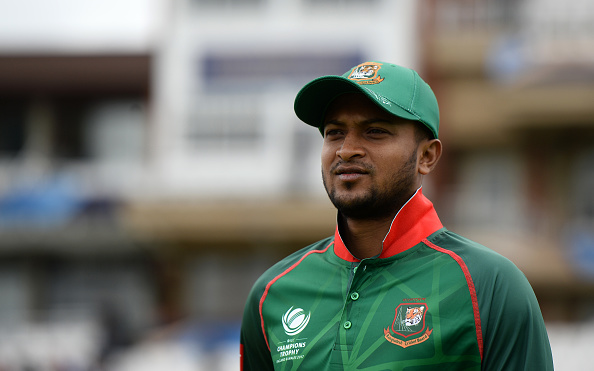Greatest all-rounder of 21st century debate - where does Shakib Al Hasan stand?
Just ahead of the 2011 World Cup, MS Dhoni and the entire Indian team management had to scratch their head for a decision - which in hindsight, probably changed the way teams approach their strategy in the ODIs for good. Yuvraj Singh became the heart, soul and so many more of India’s campaign.

To say, it was the template for other teams in the evolution of ODI cricket post-IPL era is probably going too far, but Bangladesh must be thankful to their stars for having Shakib Al Hasan, their greatest cricketer of the first two decades of sojourn in top-flight cricket.
The apparent altruistic behaviour in the first few years for the sake of his team and country and the complete opposite action in the lead up to it - remember those insane sabbaticals and prioritising IPL over the country - has made him one of the most contradictory cricketers of the modern-day cricket. However, none of this mattered as Shakib carried on as silently as humanly possible.
Otherwise, how could you explain the fact that Mark Nicholas, one of the respected voices in the sport, went as far as calling Shakib as an “understated all-rounder” during Bangladesh’s game against India when the man is actually the No.1 ICC-ranked all-rounder at the moment. Call it ignorance of the world because he plays for Bangladesh or the lack of over-the-top style in his cricket, this World Cup has possibly ensured one thing that Shakib Al Hasan deserves to be in the discussion of the 21st century’s best ODI all-rounder.
With 6259 runs in 205 matches at an average of 37.70 makes him a statistically good batsman - remember he averages more than Virender Sehwag and Yuvraj Singh - his impact with the ball was Bangladesh’s one of the most cherished weapons in the last one decade. To put things in perspective, since 1999, no one has been involved in more balls per match than him (86.3, which, of course, includes both batting and bowling) and since his debut, only Lasith Malinga has taken more wickets than him.
It is the domination in an entire era that has been the major talking point, and when Shakib let the free flow of his bat do the real talking in this World Cup - a deja vu of sorts for those who have followed him in the 2009 series between Bangladesh and New Zealand - and now the debate arises, is he actually the GREATEST all-rounder of the 21st century? What about Jacques Kallis, Shane Watson, Andrew Symonds and Shahid Afridi then?
For instance, Kallis, in a career spanned over 18 years, had scored at an average of 44.36 and even if you don’t include his 273 ODI wickets, which came at 31.79, his gargantuan 11579 runs with the bat will be the real bait. To put things in perspective, 8036 of those runs came on a winning cause. The corresponding average of Shakib is not bad either - 52.45 to Kallis’ 51.18 - but what about the impact then?
Kallis’ initiation to cricket and his peak was at a time when South Africa was embroiled by controversy and he had little support in the batting order. Although the African nation went on to have players of the calibre of AB de Villiers, Graeme Smith, and Dale Steyn, Kallis forever remained as the glue around whom the other charismatic cricketers had been given the license to express.

 © Getty
© GettyWhile the same can be said about Shakib considering Tamim Iqbal and Mushfiqur Rahim are the only two players with comparable skills and none else has taken the responsibility as much as they should have been, it is also a fact worth noting that Bangladesh’s most of the wins came against lowly-ranked teams like Zimbabwe, Afghanistan and Ireland. Against top teams, they won a lot of hearts but they don’t win games more often. So, in circumspect, it can easily be concluded that the pressure was far lesser on Shakib’s shoulders than it was for Kallis.
In the context, Symonds and Watson have also been right up there and have a strong case for themselves to build as well. The former was controversy’s favourite child but with a bat in hand, he has rarely failed to stun all and sundry with his amazing six-hitting ability. A better batsman than any of the aforementioned names sans Kallis, Symonds had to make do it a team full of superstars and rarely got the chance to perform. He batted primarily at No.5 position for Australia where he accumulated runs at 44.52 and even when he was entrusted with a far bigger responsibility to bat at No.3 or No.4, he rarely disappointed, averaging 45.25 and 35.92 respectively.
However, it is the bowling that put Symonds down, albeit for no fault of his own. While the likes of Kallis and Shakib had the opportunity to be the gangster bowlers in their team for a major part of their career, Symonds and even Watson for that matter didn’t have that option with them, because they were operating in a team full of superstars.
Then again, one wouldn’t be wrong to ask that was it really their fault that they didn’t get the freedom that Shakib and Kallis got? No. Not really. Every cricketer and their achievement is a product of their time and even though the fact that Symonds had to make do with little bowling thanks to the presence of the hostile trio of Brett Lee, Glenn McGrath, and Jason Gilespie, his 133 wickets came mostly upfront and was a huge help for the Aussies.
Likewise, Afridi, who has played the most number of matches among all the contenders, had a case for him as well, which is actually more compelling than any other. 8064 runs in 398 ODIs and 395 wickets in all of them, Afridi was a superstar of his generation. Also, the fact that he made power-hitting fashionable to bring out a wholesome change to ODI finishing act ensured that his claim to all-round greatness has become ever larger.
However, when put into straight comparison with the likes of Shakib and Kallis, is the inability to take the responsibility in either of them - he averages a minuscule 23 in batting and 34 in bowling - becomes a telling factor to dent his claim a bit. Abdul Razzaq was still a better all-rounder in that team and although he didn’t last long enough to claim himself a better all-rounder than his good pal, could we really give the proverbial throne to Afridi.
However, does that mean Shakib al Hasan is better than all of the above? That seems tenuous and although looking at the golden form he is in, it is tempting to side with him, the task is simpler said than done. For Kallis fans will shake their heads in disbelief until eternity at even the prospect of comparison with this “one-course horse” while Bangladesh fans would insist a case for Shakib with a deliberate smirk.
The debates will continue and the case will be on for eternity but the time has come to realise that Shakib has taken the claim to become the greatest all-rounder of 21st several notches higher. By the time, he calls time on his career, he would definitely compel the people to respect him as an all-time legend in the sport. It would certainly not matter whether which country he represents in or who the opposition was. After all, in cricket, statistical legacy matter more than anything else.

Comments
Sign up or log in to your account to leave comments and reactions
0 Comments